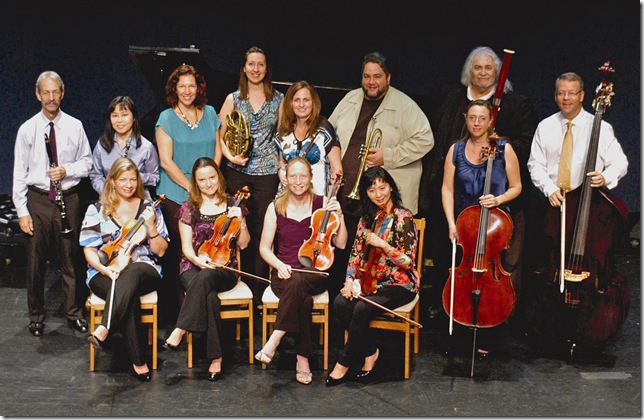When the Palm Beach Chamber Music Festival got started back in July of 1992, its organizers were pleasantly surprised to see so many people in that first audience at the Duncan Theatre.
Perhaps that will be the case when the festival looks back on its first fall series, which opened earlier this month at Lynn University and St. Andrew’s Episcopal Church in Lake Worth. The Friday night (Sept. 20) crowd in the small sanctuary at St. Andrew’s was in the neighborhood of 100 people, which for a classical music concert in the pre-season is more than respectable.
Some of those concertgoers were attendees of the four summer programs this year, and they were treated to a concert that was very much like the concerts in the hotter months: A mix of unusual and canonic repertoire, expertly played.
The concert began with a rarity, a trio (in B-flat, Op. 33, No. 2) by the early 19th-century French composer François René Gebauer. He was a bassoonist by trade, and this work, for bassoon, violin and cello, is a cannily written, charming two-movement piece that showcases the bright, athletic qualities of that instrument, particularly in its tenor register.
Bassoonist Michael Ellert, one of the founders of the festival, was the featured player here, accompanied ably by violinist Mei Mei Luo and cellist Susan Moyer Bergeron. He played this light-hearted music with vigor and style, making a good case for including more pieces by Gebauer on future programs.
Trumpeter Marc Reese was in the spotlight next, with an arrangement by Christopher Brellochs of Quiet City, Aaron Copland’s instrumental music for a play by Irwin Shaw. Usually heard with English horn and strings, here the trumpet was backed by piano (Lisa Leonard), clarinet/bass clarinet (Michael Forte), and alto saxophone (Paul Magersuppe).
Perhaps because of the character of the piano as an instrument, this version of Quiet City didn’t have the soft atmospherics that make the piece so effective in its usual guise. Reese played well, but perhaps a little harder than he might had there been no piano; still, Copland’s distinctive harmonic and melodic style were well-represented by the musicians, and came across effectively despite its relative lack of subtlety.
The first half of the program ended with one of the seemingly innumerable chamber pieces by Bohuslav Martinů, a favorite and often featured composer on the Festival’s programs. He’s particularly admired by festival co-founder Karen Fuller Dixon, who was the flutist for the performance Friday night in Martinů’s Sonata (H. 254) for flute, violin and piano; Leonard was the pianist, and Dina Kostic played violin.
Martinů’s writing, particularly in the third movement, is stay-on-your-toes territory for its musicians, with its almost constant motion, bustling rhythm and feeling of exuberance. This was a fine performance of this piece, one of the high points being the Adagio slow movement, which because of the curious plainness of so many of Martinů’s melodies is often played with detachment. But Dixon, Kostic and Leonard dug a little more out of it than that, making it sound moody and wistful without making it non-Martinů. The third movement had edge-of-the-seat interest, moving along with impressive energy, and Leonard made much of the jazz rhythms that permeate the finale. Dixon’s big, pure tone added a cool, fresh color to the music throughout, and Kostic’s clear, tightly focused sound proved ideally suited for this often-manic, engaging piece.
The second half was devoted to a single work, the Mozart Clarinet Quintet (in A, K. 581), one of the first works in this genre and likely the supreme one (though some might plump for Brahms). Forte, Luo, Kostic and Bergeron were joined by violist Rebecca Diderrich for the performance. This was a reasonably decent reading of the quintet, with all the right interpretive essentials in place. Forte does not have an especially full or powerful tone; consequently, he sounded more like a member of the ensemble than a leading player within it, which made this reading of the quintet unusually intimate.
Overall the performance didn’t have the kinds of subtle refinements that help to make the music really communicate, such as playing the theme of the finale with slightly exaggerated accents, which helps make it especially attractive. Violist Diderrich’s solo turn in the minor-key variation, on the other hand, had real personality.
The second movement, too, was pretty, as it could hardly hope not to be, but it didn’t have enough variety in its phrasing, or enough of a rapt quality in the accompaniment, to make its exceptional beauty catch the breath of its audience. Serviceable Mozart is better than no Mozart, though, and it came as a welcome piece of programming for the first of what hopefully will be a long series of winter concerts in the years to come.
The second program in the Palm Beach Chamber Music Festival’s fall season features work by two American composers: Clare Shore’s Cycle de Vie for bassoon and string quartet, and two pieces by James Stephenson for trumpet and piano: Remember Forward and Bagatelle. A wind quartet by Jean Françaix and the Piano Trio No. 3 of Brahms fill out the program. Concerts are set for 7:30 pm. Thursday and Friday, Oct. 10 and 11. The Thursday concert is at the Wold Performing Arts Center on the campus of Lynn University; the Friday concert is at St. Andrew’s Episcopal Church in Lake Worth. Call 237-9000 or visit www.lynn.edu/tickets for Lynn concerts; call 800-330-6874 or visit www.pbcmf.org for Friday concerts.
